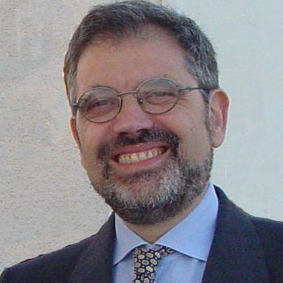 The logo of the Barbastro conference on peak oil. A bit of an unlikely place for such a conference, a small town in the Southern Pyrenees, in Spain. But the UNED is a major Spanish University that works on the concept of “Distance Learning” It is not usual to have two peak conferences in a row; spaced of just a few days from each other. But that happened this year, with the ASPO-9 conference held in Brussels, Belgium on April 27-29, and with the conference titled “Peak oil, fact or fiction?” held in Barbastro (Spain) on May 5-7; organized by the UNED (Universidad National de Educacion a Distancia).
The logo of the Barbastro conference on peak oil. A bit of an unlikely place for such a conference, a small town in the Southern Pyrenees, in Spain. But the UNED is a major Spanish University that works on the concept of “Distance Learning” It is not usual to have two peak conferences in a row; spaced of just a few days from each other. But that happened this year, with the ASPO-9 conference held in Brussels, Belgium on April 27-29, and with the conference titled “Peak oil, fact or fiction?” held in Barbastro (Spain) on May 5-7; organized by the UNED (Universidad National de Educacion a Distancia).
The two conferences had the same theme and at least one common speaker (Chris Skrebowsky). Several people attended both and I was one of them; so I think I can tell you a little about this full immersion of nearly two weeks on peak oil and related subjects.
So, first of all let me tell you that these were both very interesting conferences, at least if you are interested in dark and dire things that are going to happen in the near future. Hours and hours of talking about peak oil can’t solve the question of when exactly it will going to arrive (or has it already arrived?). That depends on how you exactly define peak oil. Is it “peak crude?” Or “peak all liquids?” Or, as someone said in Brussels, shouldn’t that be “peak net energy?”
In the end, it is not so important. From the talks I heard, I got the impression that most industry professionals in the field of oil production are aware of the issue. Some of them are more concerned than others; but their attitude is, basically, “we can keep extracting oil and even increase production if we are paid enough” But that, of course, is by no means granted, so we are facing hard times anyway. On this point there was no substantial difference between what was heard in Barbastro and in Brussels.
Of course, there were also differences. The conference in Brussels was bigger, somewhat more formal, more focussed on the specific subject of peak oil. These are, at least, my impressions – Brussels had parallel sessions, so I couldn’t follow all the talks. The Barbastro conference, instead, was less formal and taking a wider approach. Maybe the presentations in Brussels were more consistently of good quality, but some presentation in Barbastro were extremely stimulating and thought-provoking. We heard more talks in Barbastro on sustainability and the climate change issue was not a ghost howling in the night – as it was in Brussels (as I discussed in a previous post). It was a central point of the discussion, as it deserves to be. Overall, Barbastro seemed to be willing to tackle wider questions and to ask unmentionable questions; for instance, do we really own everything in this planet? If we are justified in poisoning people in order to produce combustible liquids and gas, why don’t we jump to the ultimate consequence and turn human corpses into oil? Some talks in Brussels were frankly scary, but in Barbastro some presentations made you feel like running away screaming.
I can say that I came back from Brussels with the sensation that we can still keep going for a while with things as they are (BAU) but from Barbastro I got the impression that we can’t; that we are going to get into big troubles much sooner than most people expect (BYE BAU). These are sensations, of course. The subjects being considered is so vast that it is impossible to quantify trends. We all rely on impression; trying to make some sense of the data we have. But, at least, both conferences gave you a view that is possibly slightly more reliable and in-depth than what you normally see in TV.
As a final note, some more differences: Brussels is big, the capital of Belgium and also of Europe. Barbastro is a small town in the Spanish Pyrenees. But there are things in common. One is that food is great in both places (although much more expensive in Brussels). Another is that both conferences were mostly ignored by politicians and big media. A specific problem with Barbastro was that morning sessions ended at 2:30 p.m and afternoon session at 8:pm. Then, you had lunch around 3 pm and dinner around 10 pm. You can get used to that, of course. It will be much more difficult to get used to other problems that we’ll be facing in the coming years.






